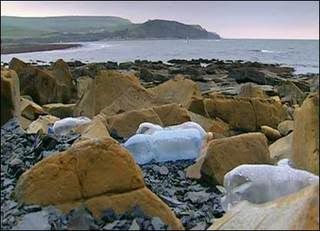(11 am. – promoted by ek hornbeck)
Knowing of my interest in food and water, a dear Australian friend of mine sent me a copy of the BBC’s excellent investigative team, Panorama, which was aired Down Under recently. The documentary showed how many Fijians are falling ill and dying from typhoid and other diseases caused by a lack of safe, clean water. The irony of course is that these South Pacific islands have a flourishing bottled water industry, worth over $200 million per year and employing around 700 people. Having visited Fiji twice I can vouch for the purity of its water. Bottles of Fiji natural mineral water are a common sight in restaurants and on supermarket shelves across the US and Europe, some are cleverly called Fiji Water, and it travels up to 10,000 miles to get to your table, depending where you are. Click on the preceding link and you will see how they use Obama’s name to push sales. Follow me for the sick story.
First let me state two simple facts: we drink well over $50 billion of bottled water annually worldwide, and the UN says access to clean water is a human right but over a billion people round the world don’t have access to safe drinking water.
In Fiji, day in day out, over a million liters of fresh water are pumped from an aquifer beneath a rain forest on Vitu Levu, the largest island. Last year, in early July the Fijian government announced a tax on bottled water designed to conserve the island’s depleting natural resources, but it was forced to abort the project following pressure from the powerful water bottling lobby group.
The bottling companies subsequently halted operations and closed down factories, saying they could no longer operate effectively operate their businesses with the new tax (Halliburton tactics?)
“We cannot produce as we will be taxed. The industry is at a standstill. We will cease production until we can resolve this extraordinary attack against the bottled water industry. The Ministry of Finance is again taking exceptionally poor advice to levy onerous excise and export duties on bottled water in a misguided effort to reduce the country’s budget shortfall and to supposedly protect water resources in Fiji. The proposed action will weaken the Fiji bottled water industry’s ability to compete in markets around the world”.
The interim government’s finance minister Mahendra Chaudhry said the tax was not new and had been imposed in other countries to generate revenue in a similar fashion.
“The bottled water companies do not have to observe this [tax], they can pass it to the consumers,”
he said. Bottle Water Industry spokesman Jay Dayal said,
“We are very pleased that at least the prime minister and attorney general intervened in the matter and resolved the whole issue. And now the bottlers will get together with the government and work out a form of compensation that is suitable to the government for the resource that we are extracting.”
And the story goes on. While we sip their water, a third of Fijians have no clean water and there are outbreaks of typhoid and dengue fever. I wish you could see this documentary, it is disheartening.
To be sure, Fiji Water gets the Remote Award (you can see on the right side of the map how far Fiji is from the nearest continent (Australia) or industrialized civilization.
The Fiji Water company claims that that distance is part of what makes their water so much more pure and healthy than other bottled waters, and that their rainfall is purified by equatorial winds after traveling thousands of miles across the Pacific Ocean. Europe and the U.S., by implication, are buffeted by winds that carry acid rain and pollutants. Well, there’s no acid rain in the European aquifer water supply yet.
Far from pollution. Far from acid rain. Far from industrial waste. There’s no question about it: Fiji is far away. But when it comes to drinking water, “remote” happens to be very, very good.
Look at it this way. FIJI Water is drawn from an artesian aquifer, located at the very edge of a primitive rainforest, hundreds of miles away from the nearest continent.
That very distance is part of what makes us so much more pure and so much healthier than other bottled waters.
Quite a few plastic bottles end up on beaches and in bird stomachs.
And some here, in plastic “soups”.
Bottled water takes a lot of energy: producing and delivering a liter of bottled water emits hundreds of times as much greenhouse gas as a liter of tap water. Then you’ve got the plastic, only one quarter of which is recycled or the glass that eats so much energy to make and re-use and often ends up in landfill or here. Ironically the bottled water business itself makes no claims for the healthiness or safety of their product above what flows from the common tap. The industry does insist however that they’re encouraging people to drink more water rather than sugary soft drinks, thus helping our collective health and hydration.
Some smart restaurants have taken off bottled water from their menu. Not everyone is happy:
Thomas Mooney, senior vice-president of sustainable growth at Fiji Water, argues that restaurants are overreacting by removing bottled mineral waters from the menu. “The fact that the bottled water market is still growing tells you it’s a product that people want,” he says. “Restaurant owners who take it off the menu should remember that their guests like bottled water and that they’re taking profit off the bill at the end of the meal.
I’ll stick to tap water, thank you.




4 comments
Skip to comment form
Author
H2O